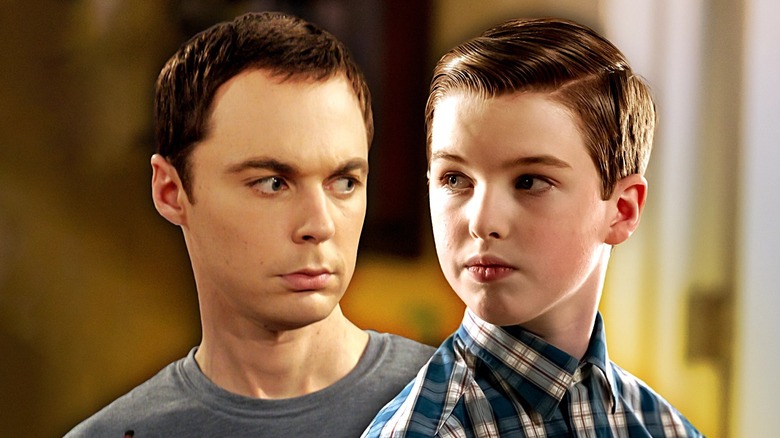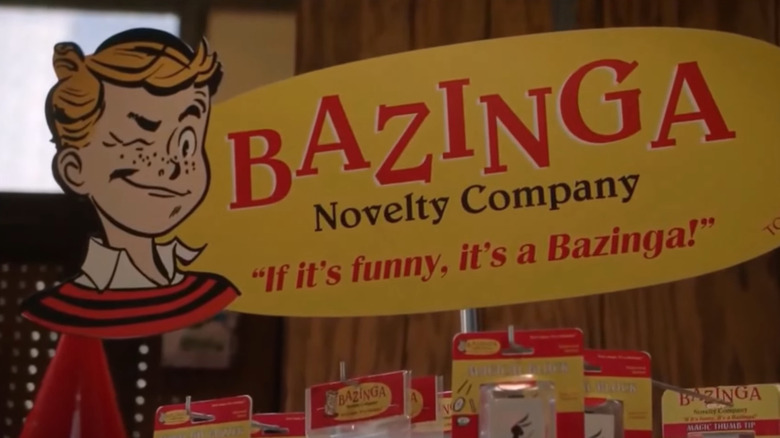Does Young Sheldon Cooper Say Bazinga? Here's How The Character Got His Catchphrase
Even if you've never seen an episode of "The Big Bang Theory," you probably know the catchphrase of its standout character Sheldon (Jim Parsons): "Bazinga!" First coined by Sheldon in season 2, he says "Bazinga!" to make clear he's telling a joke. (His jokes are so bad that the other characters often can't tell when he's making one.)
Sheldon doesn't actually say the word that much in the show (in fact, he doesn't utter it at all in seasons 6 and 7), but WarnerMedia sure didn't hesitate to trademark the catchphrase as soon as they realized it was becoming popular in real life. You can find "Bazinga!" featured heavily on "Big Bang Theory" T-shirts, posters, memes, and all sorts of fandom merchandise. When another show is doing a parody of "The Big Bang Theory," they'll likely make sure to give its Sheldon stand-in a chance to say the line.
"Bazinga!" might not be as cool a catchphrase as "How you doing?" from "Friends" or "D'oh!" from the "The Simpsons" (which had a surprising origin), but at least it was less annoying than "Duh!" in "Full House." Nor is the phrase as drawn out and obnoxious as Larry David's "Pretty, pretty, pretty good." No offense to "Curb Your Enthusiasm" fans, but I have to mute the show whenever Larry starts saying that line. (I'll unmute it ten seconds later when he finally finishes it.)
"The Big Bang Theory" prequel series "Young Sheldon" provides an explanation for how Sheldon came up with the catchphrase. In season 2, episode 10, "A Stunted Childhood and a Can of Fancy Mixed Nuts," young Sheldon sees a stand for novelty company called Bazinga. The company sells a bunch of prank items like fake chewing gum packs and whoopee cushions. The slogan on the stand reads, "If it's funny, it's a Bazinga!" and Sheldon takes the advice a little too seriously.
Young Sheldon is less annoying about 'Bazinga!' than old Sheldon
"A Stunted Childhood and a Can of Fancy Mixed Nuts" is a sweet episode of "Young Sheldon," as we watch him try and fail to become a prankster. After a series of unimpressive prank attempts, he confesses to his sister Missy (Raegon Revord) that he's "not sure I'm cut out for these antics and shenanigans." He explains further, "Life is so confusing, I always hoped it would be easier for me when I grew up but, now I'm not so sure it will." Missy comes over to comfort him, but ends up sitting on a whoopee cushion.
"Bazinga!" Sheldon tells her, happy that at least one of his pranks was a success. Old Sheldon proudly explains via voiceover, "And that's how I became the madcap prankster all my friends know and love."
The joke is that we know older Sheldon never improves much at pranking or joking. His "Bazinga!" moments always feel awkward and forced, as befitting such a socially inept character. It's worth noting, however, that young Sheldon rarely has this issue in his spin-off series. Yes, he's still socially awkward, but he does not say "Bazinga!" with anywhere near the same regularity as his future self.
There's no explicit reason for this, but there is a sad explanation implied by the finale: Sheldon, much like his mother, becomes a worse person in the aftermath of George Sr.'s death. Whereas poor Mary Cooper becomes increasingly religious and neglectful of her daughter in response to the tragedy, it seems like Sheldon becomes a little ruder and more awkward going forward.
It's not just the result of George Sr.'s death, of course. At the end of "Young Sheldon," Sheldon leaves his entire family to attend Caltech. It's a necessary step forward in his life, but it also means Sheldon is losing touch with the few people capable of grounding him and bringing out his human side. "Bazinga!" might sound like just a silly catchphrase, but it's also a window into Sheldon's tortured psyche. "Young Sheldon" gives us a look at how Sheldon was capable of growing as a person, before his father's death near the series finale brought him back to his sad "Big Bang Theory" status quo.

